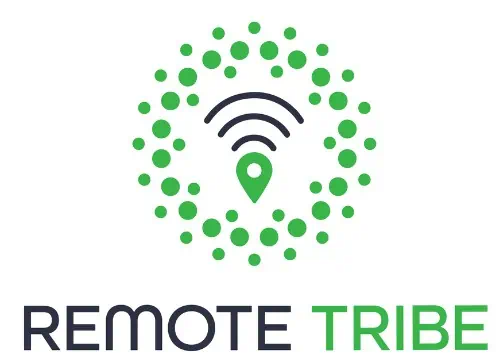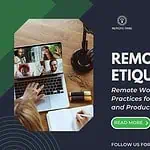The pandemic changed how we work, and things will never be the same again. Remote work has become a standard option, but it is not one-size-fits-all. The two most common models are hybrid remote work and fully remote work.
As humans spend roughly a third of their lives working, choosing how and where you work is important. We have more options than ever, and more information to make the best choice. If you are weighing up your work options, you are not alone! Millions facing this choice want their big questions answered.
Let’s weigh up the pros and cons of remote and hybrid work models to help you find the perfect work arrangement.
Table of Contents
The Basics
What is the difference between fully remote and hybrid remote work?
Fully remote work
Fully remote work means you can work from anywhere – a coffee shop, the beach, even your couch. You don’t need a physical office and never have to set foot in an in-person workplace. Your work environment is whatever you want it to be.
This option appeals to those wanting to control their work-life balance and enjoy a lot of flexibility. If you’re exploring new opportunities, check out the best cities for digital nomads in the USA for inspiration. These locations have strong infrastructure and coworking spaces.
Hybrid remote work
On the other hand, hybrid work combines in-person and remote work. Typically, it means spending a set number of days in the office and working remotely the rest of the time.
This has the advantages of real-life interactions and access to equipment and information your beach office won’t have.
These two work model options raise some big questions:
Are in-person collaborations really that important? Can you manage a work-life balance on your own? What are the nitty-gritty details?
To answer these, let us check out the pros and cons.
Hybrid and Remote Work Pros and Cons
Both hybrid and remote work models have the advantage of flexibility, albeit to a different extent. But, there are other pros and cons to consider:
Fully remote work

Pros
- Flexibility – Choosing your own hours is brilliant for night owls or those who rise at dawn, ready to go. It has been said that those who pick when they work are more productive.
- Savings – No shelling out for transport costs, office-appropriate clothing, or take-away lunches.
- Quality of life – With no daily commute, there is more time for hobbies, family, friends, and self-care!
- Global opportunities – There are no borders online. You can work for whomever you want, wherever you want. This broadens your horizons and career prospects.
Cons
- Time management – Not everyone has great time management skills. Procrastination is the reality for those who leave things until the last minute without supervision. Depending on your view, a hovering manager is either annoying or a way to ensure you get things done. Another factor is collaborating with a remote team, who may have different schedules to yours.
- Distractions – Being available for the family is fantastic – if they respect your work space and time. Being interrupted constantly will impact how effectively you work.
- Maintaining the balance – Can you turn the laptop off and go about your life? Or will you keep working, even when it’s not necessary? Are you able to keep your weekends work-free? In short – can you balance your time working and having a life? Burnout from never logging off is becoming more common.
- Forex – Being paid by an international company is wonderful if their currency is stronger than yours. But transferring that cash into your bank account attracts charges for converting. You are also totally responsible for paying taxes and possibly unemployment protection where applicable.
Practical tip: Set clear boundaries. Have a dedicated office space in your home with set office hours, and make sure colleagues and family know about them.
Hybrid Work

PROS
- Best of both worlds – In the office, you have team collaboration and in-person interactions, plus the flexibility to work from wherever you want the rest of the time.
- Networking – It is easier to build organic relationships through in-person interactions. Virtual meetings do not have the same human touch.
- Structure – Many people find that having structured office time makes it easier to separate their work and home lives, and switch off when they are done for the day.
- Mental health – Regular office visits mean less social isolation. Hybrid work mixes home comforts with in-life interactions.
CONS
- Logistical challenges – Some jobs are more challenging if the environment changes constantly. Trying to match your office time with someone else’s for meetings can be frustrating. Likewise, moving everything when working on a large project can be exhausting.
- Schedule – Fixed hybrid schedules that don’t allow changing in-office days can interrupt workflow and limit flexibility. Trying to manage personal responsibilities that you could do in an at-home work day becomes difficult when you’re in-office. It’s frustrating scheduling meetings with others who are on different office days.
- Commute – Going to the office means facing traffic, buying office-appropriate clothing, and potentially overspending on lunches with colleagues. And that’s not counting time-wasting traffic jams.
- Timing – If you are a night owl or early-morning go-getter, sticking to office hours on some days and your timing on others may disrupt a healthy sleep or work schedule.
Practical tip: Maximize your in-office days. Use them for critical meetings and those interactions that would work better face-to-face.
Hybrid vs. Remote Work: How to Choose
If you’re torn between hybrid vs. remote work, focus on these factors:
- Your personality – Do you prefer to collaborate or to work alone?
- Job requirements – Does your job need specialized equipment or regular in-person interactions?
- Company culture – Some companies support remote employees’ independence and other employers may prefer in-person workplaces.
- Family life – A hybrid model may help balance home and work responsibilities.
Practical tip: Weigh up your personal pros and cons of hybrid vs remote. Be honest with your employer about your preferences. Many companies are open to tailoring work arrangements to fit their workforce’s needs.
Subscribe to our Newsletter
Get The Latest News On Digital Nomad Lifestyle, Remote Working Communities
And Much More.
100% spam free. We never share your email address. Unsubscribe anytime!
Employers Perspectives on Fully Remote Work vs. Hybrid

Productivity – There are two schools of thought. The first believes that remote workers have increased productivity because they can choose their productive hours. The second thinks that in-person collaborations build stronger teams and encourage innovation.
Office space – A hybrid workspace needs less physical office space, which saves money on rent and utilities.
Team dynamics – Regular in-person work strengthens relationships and builds trust in a team. This is harder to achieve with video conferencing alone.
Remote workforce challenges – Managing remote employees is more challenging due to different time zones, communication gaps, and trying to keep team cohesion.
Practical tip – Employers should check in with their staff regularly, whether remote employees or in-office staff. Address concerns about the work environment, resources, and work-life balance. A happy team is a successful team.
Tips to Succeed in Any Work Model
You can succeed whether you choose a remote work model or a hybrid workplace. Use these tips to thrive:
For remote workers:
- Set a routine. Create a daily schedule and stick to it.
- Have a dedicated workspace. A quiet, organized work environment encourages focus.
- Stay connected. Make regular contact with your remote team using tools like Slack, Zoom, or Microsoft Teams.
- Prioritize well-being. Take breaks, and log off at the end of your work day.
For hybrid employees:
- Plan your week. Use your in-office days for team meetings and brainstorming sessions.
- Proactive communication. Optimize collaboration by coordinating schedules with your coworkers.
- Stay flexible. Be open to adapting your work arrangement if it’s needed.
For Employers:
- Support your team. Provide resources and training for in-office staff and remote employees.
- Use technology. Project management and team communication tools will streamline your work processes.
- Focus on outcomes. Measure success by results, not hours worked, whether employees are in-house or remote.
Making the Work Environment Practical

Whether you are a fully remote or hybrid worker, there are many ways to make your home office a great work environment.
- Make it personal. You spend a lot of time at your desk, so it should be as pleasant as possible. Add personal touches, like a framed picture or two, and a potted plant. Besides adding natural beauty to your day, indoor plants have been linked to increased productivity and creativity.
- Make it comfortable. Ergonomic chairs, keyboards, and mouse pads are designed to be kind to your body. It is far easier to be efficient when you are not suffering from a sore back or wrist.
- Protect your eyes and health. Natural lighting is not just great for seeing better; it supports your mental health by maintaining your Vitamin D levels. If you don’t have a window nearby, ensure your lighting is good to prevent eye strain.
- Have shut-down options. Switching off from work is easier if you can close an office door and walk away.
It gets trickier when your office is at home, especially if you do not have a whole room to spare. There are several options for a fold-away arrangement, where your home office folds into a cupboard. It is easier to switch off and separate work from home life if you can keep your workspace out of sight.
The Future of Work: Remote or Hybrid?
Both remote and hybrid work models are continuously evolving. The work environment changes as the workforce needs it to.
Fully remote work is infinitely more flexible. Hybrid workplaces offer flexibility but keep in-person work as part of the equation.
Practical tips:
- If you are just starting out, why not work on a cruise for a season? You will have new experiences, see the world, and be in a good position to explore remote opportunities.
- If you already have a career and are thinking of switching, try a trial run of the hybrid work model first. That way you can judge how you would adapt to being fully remote.
Emerging Trends in The Future of Work
Emerging trends keep changing the future of work, and how it will be done. Hybrid and remote work models are reshaping industries. Companies are rushing to find innovative ways to meet in-office and remote work needs. For example:
- 85% of businesses have said that having more flexible hybrid schedules has increased productivity. Employees who can choose their in-office days are more efficient.
- Office spaces are being redesigned to encourage creativity and teamwork.
- Remote-first businesses are investing in tools that support their distributed workforce like collaboration software and virtual team-building initiatives.
- Big business is starting to take mental well-being seriously. Some organizations have a proactive mental well-being stance and offer wellness programs and paid mental health days off.
Why it matters
The choice between remote and hybrid work is not just about convenience. It is about building a sustainable work environment; one that prioritizes productivity, flexibility, and employee well-being.
Your Work, Your Way
There is no magical universal solution between which work model is best for everyone. It depends on your personal preferences, job requirements, and lifestyle. You work best when you work your way.
Fully remote work offers unmatched flexibility and global opportunities. Hybrid models blend beneficial in-person collaboration with the freedom of remote work.
Take the time to reflect on what matters most to you – and do not be shy about discussing options with your employer.
Whether you choose fully remote work or a hybrid option, the future of how you work is in your hands. See you in the coffee shop – or the office!
If you want to become a digital nomad or find your crew, sign up for our free newsletter and get upcoming articles straight to your inbox!
We’ve got some great content on our Instagram and on our Facebook Group too where you can network with other nomads from all over the world.
Your Travel Resources Handy In One Place 🗺️
🧳 Travel Insurance
Enjoy peace of mind during traveling and don’t leave your country without good travel insurance. We recommend Insured Nomads or Genki for international travel insurance.
💰Travel Finances
Get your travel finances smart and straight with Wise or Revolut.
🏨 Accommodations
For a short stay check out Booking or Agoda. Staying longer? Take a look at the offers at Airbnb. Hostels are the cheapest option that you can explore at Hostelworld.
🏡 Recommended places for long-term stay
Wanna know the accommodations where we lived during our digital nomad journey? Check out the places we enjoyed the most!
🎫 Book tours
Are you up for taking part in epic guided tours? Book ones you like using GetYourGuide or Viator.
🚗 Rent a car
To find great rental car deals check out Rental Cars and get ready for your car trip!
✈️ Book a flight
For the hottest deals check out Skyscanner, Kayak, Google Flights or WayAway.
🛡️ VPN
To stay safely connected while traveling, don’t forget about a good VPN. We recommend Surfshark or NordVPN.








